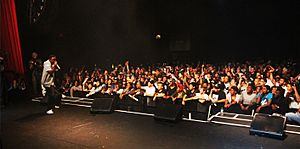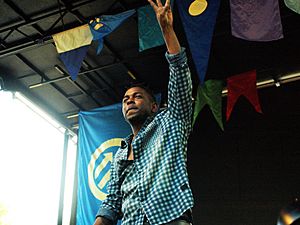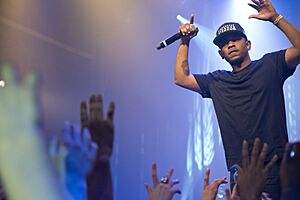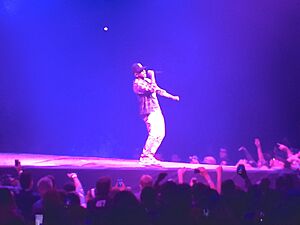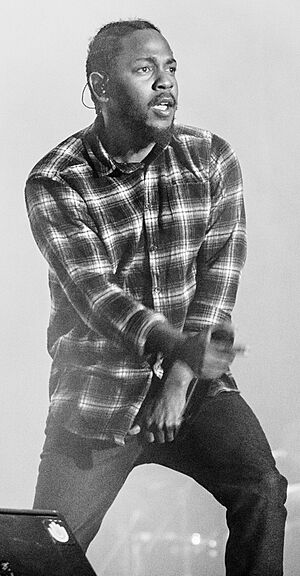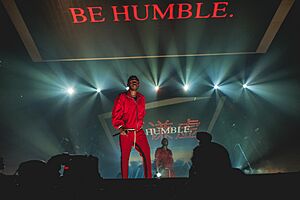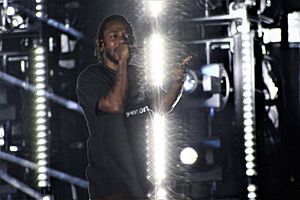Kendrick Lamar facts for kids
Quick facts for kids
Kendrick Lamar
|
|
|---|---|
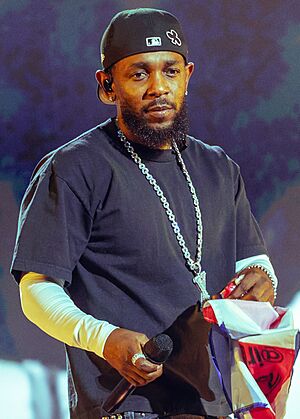
Lamar in 2025
|
|
| Born |
Kendrick Lamar Duckworth
June 17, 1987 Compton, California, U.S.
|
| Other names |
|
| Occupation |
|
| Years active | 2003–present |
| Organization | PGLang |
|
Works
|
|
| Partner(s) | Whitney Alford (eng. 2015) |
| Children | 2 |
| Relatives |
|
| Awards | Full list |
| Musical career | |
| Origin | Compton, California, U.S. |
| Genres |
|
| Instruments | |
| Labels |
|
| Signature | |
Kendrick Lamar Duckworth, born on June 17, 1987, is an American rapper. He is known as one of the most important hip-hop artists of his time. In 2018, he won the Pulitzer Prize for Music. He was the first musician outside of classical and jazz music to receive this special award.
His 2025 Grand National Tour with SZA was the highest-grossing co-headlining tour ever. Beyond music, he co-founded the creative company PGLang and has worked on films.
Contents
Kendrick Lamar's Early Life
Kendrick Lamar Duckworth was born in Compton, California, on June 17, 1987. His parents were from Chicago. Even though he was not in a gang, he grew up around gang members.
When he was eight years old, Lamar saw famous rappers Tupac Shakur and Dr. Dre filming their music video for "California Love". This was a very important moment for him. As a child, he went to McNair Elementary and Vanguard Learning Center. He later graduated from Centennial High School in 2005 with excellent grades.
Kendrick Lamar's Music Career
In 2003, when he was 16, Lamar released his first collection of songs called a mixtape. He used the name K.Dot. This mixtape helped him become known in his local area. It also led him to sign a recording contract with Top Dawg Entertainment (TDE). This was a new independent record label in Carson, California. Two years later, in 2005, he released another mixtape called Training Day. It had 26 songs.
From 2006 to 2007, Lamar performed as an opening act for famous West Coast rapper The Game. He performed alongside other new rappers like Jay Rock.
Becoming a Solo Artist
Lamar later became a founding member of a hip hop group called Black Hippy. After this, he stopped using the name K.Dot. He started using his real first and middle names professionally. In 2011, he released his first studio album, Section.80. This album was a conscious hip hop record, meaning it focused on social messages. It received good reviews and included his first single, "HiiiiPower".
Major Record Deals and Albums
In 2012, Lamar signed a record deal with Dr. Dre’s Aftermath Entertainment. This was part of Interscope Records. He then released his second studio album, Good Kid, M.A.A.D City. This album had a West Coast and gangsta rap style. It was praised by critics and sold very well. It included popular songs like "Swimming Pools (Drank)" and "Backseat Freestyle".
good kid, m.A.A.d city was released on October 22, 2012. It quickly became very popular. In just a few months, the album earned a gold award. This means it sold over 500,000 copies. Many music experts called Lamar the "Emcee of the Year" in 2012.
In October 2013, Lamar won five awards at the BET Hip Hop Awards. These included Album of the Year. He was also named GQ magazine's "Rapper of the Year" in November 2013.
At the 56th Annual Grammy Awards in 2014, Lamar was nominated for seven Grammy Awards. However, he did not win in any of those categories that year.
Inspiring New Sounds
A trip to South Africa inspired Lamar's third studio album, released in 2015. This album had a jazz sound. It was highly praised and became his first number-one album on the Billboard 200.
In May 2015, Lamar was featured on the remix of Taylor Swift's song "Bad Blood". He also appeared in the music video. The song reached number one on the Billboard Hot 100. The music video won a Grammy Award for Best Music Video and an MTV Video Music Award for Video of the Year.
Lamar's fourth studio album explored different music styles like R&B, pop, and psychedelic soul. This album included his first solo number-one song, "Humble". It also made history by being the first work outside of classical and jazz music to win the Pulitzer Prize for Music.
In March 2016, Lamar released Untitled Unmastered. This album had eight untitled songs. It also reached number one on the US Billboard 200.
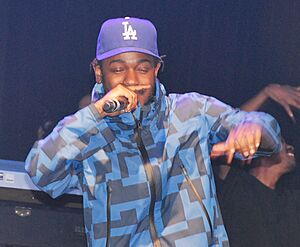
After a break of four years, Lamar released his fifth studio album, Mr. Morale & the Big Steppers, in 2022. This album was his last with TDE. He has also directed and produced many music videos and films with his creative partner Dave Free. Together, they started a creative group called PGLang.
To support Mr. Morale & the Big Steppers, Lamar went on the Big Steppers Tour. This tour lasted from July 2022 to March 2024. It earned over $110 million, making it the highest-earning rap tour at that time.
Kendrick Lamar's Artistic Style
Musical Influences
Lamar says that Tupac Shakur is his biggest influence. He notes that Shakur has affected his music and his daily life. He has also said that Shakur, the Notorious B.I.G., Jay-Z, Nas, and Eminem are his top five favorite rappers.
Music Style and Rapping
Lamar's music style is known for being "anti-showy, deep, and complex." His work is often called progressive rap. This is because he helped bring this type of music to more people. He once said, "You really can't categorize my music, it's human music."
Songwriting and Themes
Lamar's songs often tell stories from his own life. His writing also includes political and social commentary. He often writes about African American life and culture.
Other Projects
Acting and Filmmaking
Lamar started his filmmaking journey by writing the music video for his song "Ignorance Is Bliss". He directed his first music video for "Backseat Freestyle". Since then, he has directed many of his music videos with his partner Dave Free. They work together as The Little Homies. In 2014, Lamar produced a short film called M.A.A.D. It was inspired by his album Good Kid, M.A.A.D City. In December 2015, he helped direct and star in the short film God Is Gangsta. In 2020, he started producing music videos, beginning with Baby Keem's "Hooligan".
In January 2022, he signed on to produce a comedy film with Free, Trey Parker, and Matt Stone. This film is set to be released in March 2026.
In July 2018, Lamar acted for the first time in the TV show Power. He became friends with rapper 50 Cent, who stars in the show. Lamar wanted to play a character different from his music persona. He found inspiration from people he knew growing up in Compton. He said acting was like songwriting, as he likes to "always have that open space to evolve." Critics and viewers praised Lamar's acting. He was even nominated for an NAACP Image Award.
Business and Fashion
Lamar owns a part of his former record label, Top Dawg Entertainment. In December 2014, he became a brand ambassador for the sportswear company Reebok. He designed six pairs of sneakers with them. After leaving Reebok in 2017, Lamar partnered with Nike. He worked on five pairs of sneakers with them. In 2022, he also worked with Converse on two pairs of sneakers.
Impact and Influence
Music critics, other artists, and cultural leaders have all highly praised Lamar's work. Many media outlets have named him one of the most influential artists of the 2010s. Billboard magazine even listed him as one of the greatest rappers of all time. NPR Music has said he helped bring back jazz rap, a style that was less popular after the 1990s.
Many artists have said that Lamar's music inspires them. These include Khalid, Roddy Ricch, Christine and the Queens, Jhené Aiko, Cordae, Car Seat Headrest, and Dua Lipa.
Awards and Achievements
Kendrick Lamar has won many awards during his career. He has received 22 Grammy Awards. This is the third-most won by any rapper. At the 65th Annual Grammy Awards, he made history. He became the first artist from any music style to be nominated for Grammy Award for Album of the Year for four albums in a row. This had not happened since Billy Joel in the early 1980s.
Lamar has also won a Primetime Emmy Award, a Brit Award, four American Music Awards, six Billboard Music Awards, and 11 MTV Video Music Awards. He has won the MTV Video Music Award for Video of the Year twice. He has also won 37 BET Hip Hop Awards, which is the most by any artist. In 2016, Time magazine named him one of the 100 most influential people in the world.
Personal Life
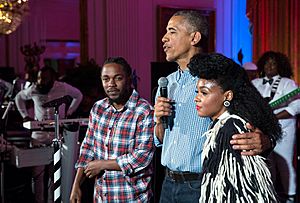
While attending Centennial High School, Lamar started dating Whitney Alford. In April 2015, Lamar shared that they were engaged. The couple has two children together: a daughter named Uzi, born in July 2019, and a son named Enoch.
Interesting Facts About Kendrick Lamar
- His mother, Paula Oliver, named him after singer-songwriter Eddie Kendricks from The Temptations.
- Lamar grew up in a family that received welfare and lived in Section 8 housing.
- He has said that he was quiet and shy when he was in school.
- Lamar has a strong singing voice called a tenor vocal range. He also has a rough, powerful voice.
- He is a strong believer in Christianity.
- Lamar is a big fan of the Los Angeles Lakers, the Los Angeles Dodgers, and the Los Angeles Rams sports teams.
- He often calls himself the "Greatest Rapper Alive" and once said he was the "King of New York".
Discography
Studio albums
- Section.80 (2011)
- Good Kid, M.A.A.D City (2012)
- To ... a Butterfly (2015)
- Damn (2017)
- Mr. Morale & the Big Steppers (2022)
- GNX (2024)
Filmography
- God Is Gangsta (2015)
- Quincy (2018)
- Kendrick Lamar Live: The Big Steppers Tour (2022)
- Renaissance: A Film by Beyoncé (2023)
- Piece by Piece (2024)
- Whitney Springs (2026)
Images for kids
See also
 In Spanish: Kendrick Lamar para niños
In Spanish: Kendrick Lamar para niños
- List of American Grammy Award winners and nominees
- List of artists who reached number one in the United States
- List of artists who reached number one on the U.S. Rhythmic chart
- List of black Golden Globe Award winners and nominees
- Music of California


